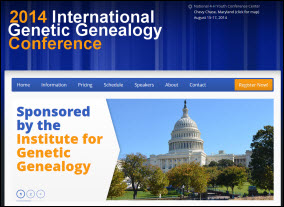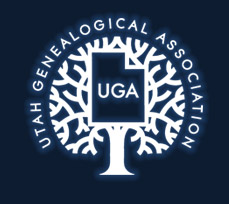DNA education
It’s probably the one thing The Legal Genealogist hears most often about DNA testing and its use in genealogy.
The frustrated wails.
“It’s too complicated.” “I’m not a scientist.” “I don’t understand.”
All of which I do understand.
Because it is complicated. Because I’m not a scientist either. Because, even now, there’s a fair bit that I don’t understand.
But we can learn. And there have never been better opportunities to learn than exist right now. DNA, and DNA education, have gone mainstream in the genealogical community.
We all have options — good ones — to learn more about using DNA in our research.
Family History and DNA: Genetic Genealogy in 2014
First up is the Family History and DNA Day in Burbank, California.
 On Thursday, June 5 — less than two weeks from now! — the Southern California Genealogical Society and the International Society for Genetic Genealogy are co-sponsoring a day-long Family History and DNA: Genetic Genealogy in 2014 conference in Burbank as a precursor to the SCGS Jamboree.
On Thursday, June 5 — less than two weeks from now! — the Southern California Genealogical Society and the International Society for Genetic Genealogy are co-sponsoring a day-long Family History and DNA: Genetic Genealogy in 2014 conference in Burbank as a precursor to the SCGS Jamboree.
Advance registration for the conference is closed, but walk-in registration will be available and — for those who can’t drop everything and fly to California — five of the sessions will be livestreamed.
Individual sessions cost $30 each, but there’s an All-Day Pass for a discounted price of $130 where you’ll get the complete DNA conference syllabus of all 20 presentations.
The five live-streamed sessions are all on June 5th, and they are:
• TH003 – 10:00AM – CeCe Moore: “Real World Stories from the Desk of a Genealogy DNA Detective”
• TH007 – 11:30AM – Diahan Southard: “Lab Tour: How Your Data is Generated”
• TH010 – 2:15PM – Blaine Bettinger, PhD, JD: “Using Autosomal DNA to Explore Your Ancestry”
• TH015 – 3:30PM – Dr. Maurice Gleeson: “Which DNA is Best for You?”
• TH021 – 5:00PM – Tim Janzen, MD: “Advanced Techniques for Use of Autosomal DNA Tests to Break Through Genealogical Brick Walls“
Institute for Genetic Genealogy, August 15-17
The next major chance to learn is at a brand new conference, to be held in August, all the way east on the other coast.
 Registration is open right now for the 2014 International Genetic Genealogy Conference to be held August 15, 16 and 17, 2014 at the National 4-H Youth Conference Center in Washington, D. C. The speakers include many of the most knowledgeable genetic genealogists and population geneticists from around the world. (And an occasional storyteller like me…)
Registration is open right now for the 2014 International Genetic Genealogy Conference to be held August 15, 16 and 17, 2014 at the National 4-H Youth Conference Center in Washington, D. C. The speakers include many of the most knowledgeable genetic genealogists and population geneticists from around the world. (And an occasional storyteller like me…)
Dr. Spencer Wells of the National Geographic Society’s Genographic Project will be the keynoter, and the individual presentations range from that occasional storyteller telling tales out of school to in-depth presentations on understanding YDNA, mtDNA and so very much more.
A full list of the speakers and topics can be found here, but let me whet your appetite with these tidbits about just a few of the presentations:
• My own about my Southern family, burned courthouses and DNA — “After the Courthouse Burns: Lighting Research Fires with DNA”
• Blaine Bettinger Ph.D., J.D., on “Using Free Third-Party Tools to Analyze Your Autosomal DNA” to help explain the many free third-party tools out there
• Shannon Christmas, on “Identity by Descent: Using DNA to Extend the African-American Pedigree” and overcome challenges unique to African-American genealogy research
This conference is a steal at $85 in registration costs, and both housing and meals are available at a discounted rate as well. Full price information can be found here.
2015 Salt Lake Institute of Genealogy (SLIG)
If summer’s not your thing, try winter in Salt Lake City. You can not only learn about DNA, but there’s that minor little attraction called the Family History Library…
 Registration opens on June 14th for next January’s Salt Lake Institute of Genealogy (SLIG), and SLIG will be offering two tracks — one for beginners and those who want to deepen their basic understanding of DNA testing, and one for more intermediate-to-advanced genealogists.
Registration opens on June 14th for next January’s Salt Lake Institute of Genealogy (SLIG), and SLIG will be offering two tracks — one for beginners and those who want to deepen their basic understanding of DNA testing, and one for more intermediate-to-advanced genealogists.
The first track — Getting Started with Genetic Genealogy — is coordinated by Debbie Parker Wayne, CG, CGL, and it will both give beginners a solid foundation in using genetics for genealogy and help those with some experience to fill in holes in their understanding. The class will be introduced to tools and techniques with practical, hands-on exercises.
The second track — Advanced DNA Analysis — is coordinated by CeCe Moore and Angie Bush, and this is “the next step in genetic genealogy education, with a focus on preparing professionals and others to work on genetic genealogy cases and strengthen the skills of those who are already doing so.” It’s designed for the genealogist who has a thorough understanding of genetic genealogy basics and has experience applying DNA testing to family history research, and there are prerequisites so be sure to check the page before registering.
SLIG in 2015 will be held January 12-16 at the Hilton Salt Lake City Center Hotel in Salt Lake City, Utah. General information can be found here, and a description of all the tracks (including the Family History Law Library course I’m coordinating with Rick Sayre) can be found here.
2015 Genealogical Research Institute of Pittsburgh (GRIP)
If a residential program on a gorgeous college campus is your preference, mark your calendar for the summer of 2015.
 As at this year’s institute, a sterling line-up of instructors will be presenting a DNA track at next year’s Genealogical Research Institute of Pittsburgh (GRIP), on the LaRoche College campus — and there are two choices for the time frame, since GRIP will offer two sessions next summer. (Can we say “thanks for flexibility,” boys and girls? I knew we could…)
As at this year’s institute, a sterling line-up of instructors will be presenting a DNA track at next year’s Genealogical Research Institute of Pittsburgh (GRIP), on the LaRoche College campus — and there are two choices for the time frame, since GRIP will offer two sessions next summer. (Can we say “thanks for flexibility,” boys and girls? I knew we could…)
The Practical Genetic Genealogy course, coordinated by Debbie Parker Wayne, CG, CGL, will be offered during the first GRIP week — June 28 to July 3, 2015 — and again a second time during the second GRIP week — July 19 to 24, 2015.
The inaugural offering of this course, for 2014, sold out in minutes. Having it offered twice next year gives folks at least a fighting chance at a slot in one of the two sections.
Mark your calendars for February and keep an eye on the GRIP website for the exact registration dates.
Something for everybody… it’s good to be a 21st century genealogist!



Thank you, Judy, for hearing the cry of people like myself who recoil when hearing those letters, “D-N-A.” Definitely not a scientific thinking mind right here. The above opportunities are fantastic! Yet I continue to search for a blog or website that focuses on using DNA findings in genealogy geared for the beginner. Have you come across and sites that may be useful to someone like myself?
Two sites I’d recommend for sure, Debra, are Kitty Munson Cooper’s blog particularly after reading and working through her DNA Basics section, and, always, for someone just getting into DNA, the DNA Newbies group run by ISOGG at Yahoo is a must.
Debra, join ISOGG and sign up for the DNA-Newbies list. It sounds scary at first, but just keep reading and it will start to sink in. If something is way over your head, just move along. And ask questions – the members are very willing to help, as that is what the list is all about. My husband remarked to me the other day how proud he is at what I have learned. Funny, I still feel pretty dumb! LOL
Kathleen
I second and third everything Judy and Kathleen recommend. (Disclosure: I am one of the mods at the DNA Newbie List and we would love to have you. :-))
I just wanted to add that you might want to check to see if there is a DNA Interest Group in your area. Our group in Carlsbad, CA has really come a long way. (Incidentally, Kathleen recently took over the administration of it.)
Lastly, I really wanted to thank you, Judy, for summarizing all of the upcoming educational opportunities available for genetic genealogy. I have been meaning to do so for the last couple of weeks and just haven’t had a chance! We are so excited that you agreed to speak at the I4GG conference in August! I do believe we had a spike of registrations when that news got out! 🙂
Happy Memorial Day Weekend to all!
CeCe
And a very Happy Memorial Day Weekend to you too, my friend. Hope you get to relax for, oh, at least 15 minutes of it.
I have figured out what I want to be when I grow up.
Then you’re one up on me. I’m still figuring it out…